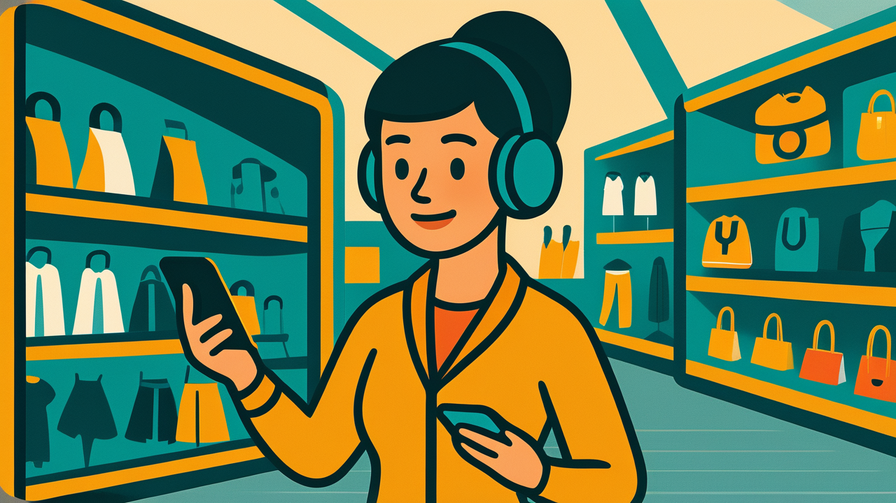[Disclaimer] This article is reconstructed based on information from external sources. Please verify the original source before referring to this content.
News Summary
The following content was published online. A translated summary is presented below. See the source for details.
Debenhams Group, the company behind popular fashion brands like Debenhams, PrettyLittleThing, and boohoo, is revolutionizing online shopping using artificial intelligence powered by Amazon Web Services (AWS). The company is implementing AI technology that can write product descriptions 20 times faster than humans and instantly translate them into six languages. Their new AI Room Styler lets shoppers upload a photo of their room and receive personalized decoration suggestions with direct links to buy the items. The AI system also learns from shopping patterns to show customers products they’re more likely to love, making it easier to find exactly what they’re looking for among millions of items. This technology has already transformed how Debenhams operates – tasks that once took weeks now happen in minutes. The company plans to roll out these AI features across all their brands, fundamentally changing how young people shop for fashion and home goods online. By automating repetitive tasks, employees can focus on creative work like designing new collections and improving customer experiences.
Source: Amazon Press
Our Commentary
Background and Context

Debenhams was once Britain’s most famous department store chain, with huge physical stores in every major city. Founded in 1778, it survived over 240 years before closing all physical locations in 2021. But instead of disappearing, Debenhams reinvented itself as an online-only marketplace – like a fashion-focused version of Amazon.
The shift from physical stores to AI-powered online shopping represents one of retail’s biggest transformations. Young shoppers today expect personalized experiences, instant gratification, and endless choice – demands that traditional stores struggle to meet but AI can deliver effortlessly.
Expert Analysis
The AI technologies Debenhams is using solve real problems shoppers face daily. Ever scrolled endlessly trying to find the perfect outfit? AI-powered search understands what you mean even if you type “sparkly dress for prom that’s not too expensive.” The system learns from millions of searches to understand fashion terminology, trends, and even slang.
The Room Styler feature addresses “blank room syndrome” – when you want to decorate but don’t know where to start. By analyzing your photo, AI can suggest items that match your existing style while introducing new ideas. It’s like having a personal interior designer who knows every product in the store and never judges your current decor.
Additional Data and Fact Reinforcement
The scale of this transformation is staggering. Debenhams sells over 300,000 products from 3,000 brands – writing unique descriptions for each would take humans years, but AI completes it in days. Translation into six languages means reaching 2.5 billion potential customers who don’t speak English as their first language.
Young consumers drive these changes. Gen Z spends an average of 6 hours daily online, with social media heavily influencing purchase decisions. They expect shopping to be as seamless as scrolling TikTok – AI makes this possible by predicting what you’ll like based on browsing patterns, similar to how social media algorithms work.
Related News
This AI shopping revolution extends industry-wide. ASOS uses AI to predict which sizes customers need, reducing returns. Stitch Fix employs AI stylists to curate personalized clothing boxes. Amazon’s AI can now model how clothes look on different body types without photoshoots.
The technology raises important questions. As AI gets better at predicting what we want, do we lose the joy of unexpected discoveries? When algorithms know our style better than we do, who’s really making the fashion choices?
Summary

Debenhams’ AI transformation shows how technology is fundamentally changing shopping from a time-consuming chore to a personalized, efficient experience. For young consumers who’ve grown up online, these AI features feel natural – why shouldn’t technology understand what you want? As AI becomes more sophisticated, the line between online shopping and having a personal stylist will continue to blur, making fashion more accessible while raising questions about privacy and authentic choice.
Public Reaction
Young shoppers love features like instant visualization and personalized recommendations, comparing them to filters on social media. Fashion workers worry about job security but appreciate being freed from repetitive tasks. Privacy advocates question how much data companies should collect about shopping habits. Small fashion brands see opportunities to reach global customers through AI-powered marketplaces.
Frequently Asked Questions
Q: How does AI know what fashion I’ll like?
A: AI analyzes your browsing history, purchases, and items you’ve liked, then finds patterns. It’s similar to how Spotify recommends music or Netflix suggests shows.
Q: Is my data safe when AI tracks my shopping?
A: Reputable companies follow data protection laws, but always read privacy policies. You can usually opt out of personalization features if uncomfortable.
Q: Will AI replace fashion designers and stylists?
A: AI handles repetitive tasks like writing descriptions, but human creativity remains essential for designing clothes and understanding cultural trends. AI assists rather than replaces creative professionals.


